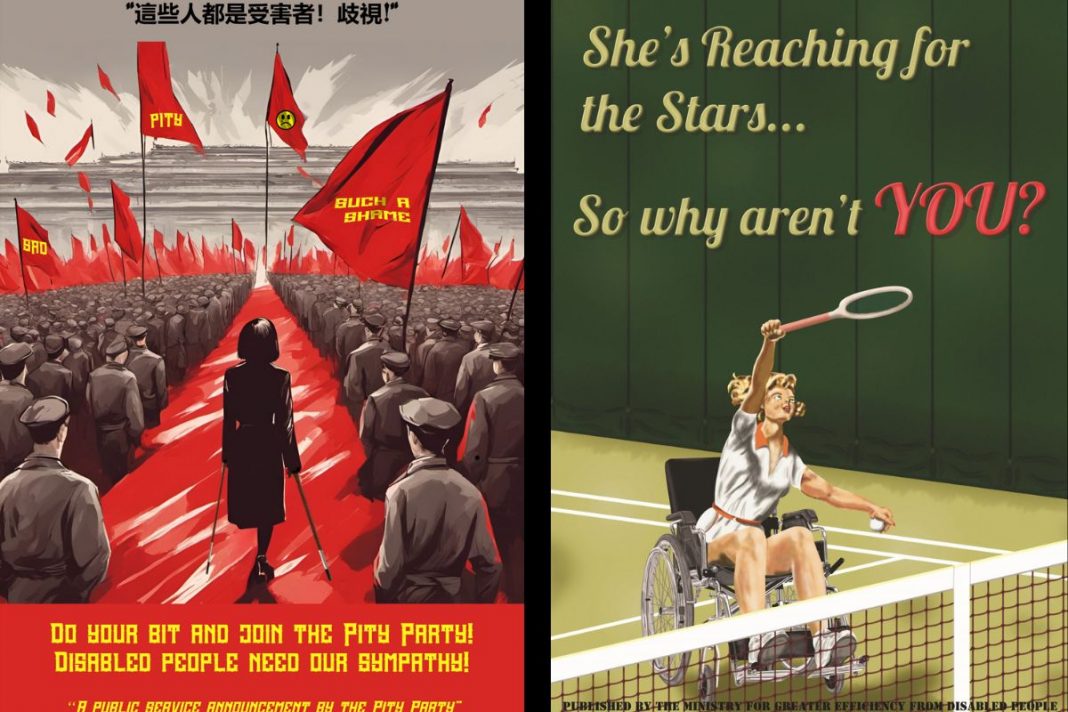A blonde young woman in a wheelchair wields a tennis racquet: ‘She’s reaching for the Stars… so why aren’t you?’ asks the poster, purportedly from the Ministry of Greater Efficiency for Disabled People.
“They walk among us!” shrieks another poster, a collage of sensationalist headlines about dangerous people with mental illness.
In a third, a woman on crutches stands at the back of a Maoist mass rally; the poster urges the public to ‘Do your bit and join the pity party! Disabled people need our sympathy!’
And a fourth, from the Department of Eugenics and Sterilisation, emulating Nazi propaganda, black Gothic script on a violent red background, calls for an end to the ‘suffering’ of Gary, who has muscular dystrophy and relies on a wheelchair, chillingly dismissing his career as a computer programmer, his 20-year marriage, or his ability to cook a mean chilli as ‘not relevant’.
These are some of the works in Canberra artist John Brookes’s new exhibition DISCRIMINATE, a challenging and satirical look at how media depicts people with disabilities, and reinforces limiting preconceptions.
Inspired by the German Dadaist John Heartfield, who created photomontages of Nazi propaganda to subvert it, Mr Brookes uses the style and design of early 20th century propaganda posters from the two world wars, Communist China, and the Cold War to highlight and expose the prejudice many people with physical and mental disabilities face.
Mr Brookes, who has a disability himself, said he had sometimes been the victim of prejudice. “I’ve been judged for being a white expat British guy with a disability. Obviously, people have had much worse than that,” he reflects.
According to a recent UN report, mainstream media portrays people with disabilities as ‘victims’ (weak, needing extra support), ‘heroes’ (inspirational in how they conform to ableist society, but under pressure to over-achieve), or ‘villains’ (demonised for mental health issues). Mr Brookes encourages people – disabled or not – to be ‘discriminating’ (between right and wrong) in their outlook, rather than ‘discriminatory’ (against people).
“I want to make people think, challenge them, and inspire them to not be complacent,” Mr Brookes said. “People in the ACT have become complacent. They go to an exhibition and think they’re ‘woke’. I would love it if people stopped thinking paying lip service to the arts is enough. It’s not. You have to actually do something.”
While the posters are thought-provoking, even provocative, Mr Brookes emphasises that they are not intended to offend. In fact, he said, the response from the disability community has been overwhelmingly positive. He showed the posters to focus groups, including people with disabilities.
“Am I going too far? Is this offensive or not?” he wanted to know. “I’ve had nobody say that they think this is offensive. All of them have said they think this is great; finally, somebody’s saying something which is not just complacent or pandering. Without exception, everybody has loved it. That gave me validation. I’m not here to be controversial or upset people.”
Mr Brookes became an artist after a career in marketing in the public, government, commercial, and disability charity sectors, including for the London Police and the Royal National Institute of the Blind.
In the aftermath of 2016’s Cyclone Winston, Mr Brookes went to Fiji to volunteer with the Spinal Injuries Association of Fiji, document relief efforts, and promote disability arts as a form of healing. But he picked up a virus from the water that caused his organs to fail. The doctors gave him two days to live. He recovered, but his kidney and liver were permanently impaired.
That near-death experience caused him to reflect on life, and to resolve to follow his passion for art.
“When I got my disability in Fiji, it gave me a bit of a break, and a bit of a shake-up,” Mr Brookes said. “I kept thinking you’ve only got one life – do what you want to do, and hopefully something that’s a help to others as well.”
When he returned to Canberra, he started working with Belco Arts’ IGNITE program, a group of artists with disabilities.
“That got me interested in that particular area of the arts and thinking about how we get this across, because a lot of disability is not visible,” Mr Brookes said. “You don’t have to be in a wheelchair to be disabled.”
Mr Brookes set up Cranberry Communications, a non-profit organisation that supports and advocates art projects for and about disenfranchised communities.
He has received the ACT Chief Minister’s Award for Inclusion for Excellence in Volunteer Support, and was nominated for the Lifetime Achievement Award.
Mr Brookes has another exhibition, Dark Snow, at the Belconnen Community Gallery, looking at the effects of climate change through photographs of the Snowy Mountains. But his next exhibition, he says, will be “a mental break from the heavy stuff”. Unconditional, opening next year, will be about the forms unconditional love can take, whether for another person, pets, or even one’s car.
Compassion, he says, is the most important thing – a lesson he learnt from his mother. Any discrimination against anybody, whether it’s based on race, gender, orientation, disability, is wrong, but too many people, he believes, are quick to judge these days.
“I have enough confidence in my own belief, which is that everybody is equal to engage with others, not to go on the attack.”
DISCRIMINATE: Belconnen Arts Centre, opens 1 December 6pm; runs until 11 February 2024.
For more information, visit www.belcoarts.com.au/DISCRIMINATE



